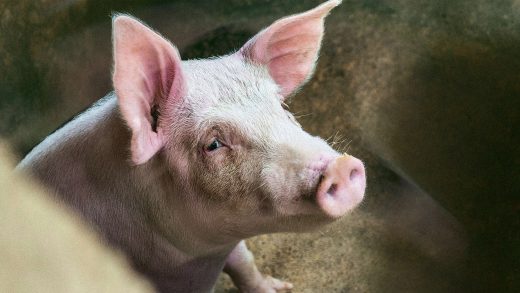Pigs aren’t the future of organ transplants—stop acting like they could be
Pigs aren’t the future of organ transplants—stop acting like they could be
Pig-to-human organ transplants have shown minimal success. We ought to be investing in better, less cruel alternatives.
Earlier this week, it was reported that Rick Slayman, the first person to ever receive a transplanted pig kidney, sadly passed away less than two months after the procedure. While the hospital, Massachusetts General, has stated that there’s no evidence that the patient’s death was a direct result of the transplant, it’s clear that the surgery did not succeed in substantially extending Slayman’s life.
It’s not surprising or unusual when an experimental medical procedure fails, and some amount of failure is inevitable in the pursuit of any kind of scientific discovery. But his death is only the latest of multiple indications that cross-species organ transplants don’t work. The scientific community would do better to devote the time and resources to a different avenue—one that might actually be a long-term solution.
Slayman was the first person to receive a pig kidney, but there have been two prior cases in which patients received a pig heart. Sadly, neither was successful. Cross-species organ transfer, called xenotransplantation, is an interesting idea, for sure. And in some of the experimental cases, the patient’s body didn’t reject the foreign organ, at least not right away. But there’s scant evidence that xenotransplantation can actually extend the life of a person experiencing organ failure. And as long as that’s the case, raising pigs for organ transplants in humans is an unnecessary cruelty, not to mention a waste of resources and a disservice to patients.
Pigs are intelligent and sensitive animals, with cognitive abilities that outrank dogs and, in fact, compare to those of a 3-year-old human child. Pigs have demonstrated the capability for spatial learning and memory, problem-solving, and the use of tools. They’re highly emotionally intelligent, displaying a preference for familiar humans and have even demonstrated what’s called “emotional contagion,” wherein one animal mirrors the emotions of another—an indicator of empathy. It’s little wonder that pigs are often kept as pets, and like dogs and cats, they have their own distinct personalities. It would be a major ethical misstep if our society were to create a system that calls for the torture and slaughter of even more pigs than the 3.8 million already killed daily by the factory-farming meat industry.
I have nothing but sympathy for Slayman and his family, and if I or a loved one were sick, I’d also do everything in my power to extend my life or theirs. But the medical establishment isn’t doing any of us a favor by continuing to waste time and money on animal testing that may or may not have any practical applications for human health.
It bears reminding that mice, dogs, and monkeys aren’t miniature people, which is why conducting experiments on them to better understand the human body is worse than useless. We have lots of analogous parts—hearts that pump blood, lungs that oxygenate the blood, stomachs that break down food—but they’re still different species entirely. Chocolate is lethal to dogs; to humans, not so much. Scientists have cured cancer in mice, but we’ve yet to see the science applied successfully to human patients. Furthermore, there are unique risks of xenotransplantation, like the cross-species transfer of diseases (which may in fact have been a contributing or causal factor in the death of one pig-heart recipient).
We’ve already seen the effects of various zoonotic diseases, and it seems patently unwise to open up a whole new avenue for diseases to transfer between species. Animal testing in medicine is no longer required by the FDA, in part due to the fact that so many animal trials resulted in little useful—and sometimes misleading—information about how a drug will affect humans.
Part of the problem is that there simply aren’t enough organs to meet the needs of people experiencing organ failure. That’s where pigs come in—as a potential alternative that could scale without limitation, given that our society doesn’t require consent from nonhuman animals for organ donation, or anything, really. But there are more viable and ethical options available to us.
For starters, Vox Media senior correspondent Dylan Matthews writes that “getting 136,000 human kidneys for transplant every year in the U.S. is very possible,” if we can revamp organ-procurement practices from the deceased to be less wasteful. And we can try to incentivize more healthy people to donate one of their kidneys, like by providing them tax incentives, at minimal risk to their own health.
Beyond organ donations, there are some fascinating and promising technological developments happening in organ-transplant medicine right now, and they have nothing to do with animals. A hospital in Seoul recently created an artificial windpipe via 3D printing, and all signs so far point to a successful outcome for the patient. Elsewhere, scientists are looking into making blood vessels out of ice to facilitate organ transplants and raise their rate of success. These methods use cutting-edge ideas and avoid the issue of animal cruelty and the risks of xenotransplantation altogether.
If we could make working organs on demand, customized to patients’ bodies, imagine the effects. People with life-threatening diseases wouldn’t have to wait years on donor lists, possibly never making it to the top. Hospitals and donor programs wouldn’t have to deal with the potentially sticky ethics of determining who gets an organ from a human donor and who gets one from a pig—a potential disaster in a medical system that’s already rife with racial– and gender-based discrimination. There’s no reason for us to keep trying a process with such clear ethical drawbacks and minimal success. We have newer, better technology—let’s use it.
ABOUT THE AUTHOR
(13)



